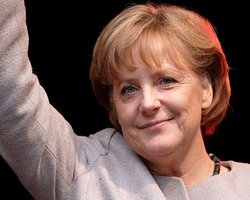The US Treasury has criticized German and Chinese economic models, saying the Chinese Yuan is too undervalued and Germany’s export-led growth model is undermining not only the economies of the Eurozone members, but also that of other nations.
Criticism of the Chinese economic model is nothing new, but to publicly point out what’s wrong with the German model is unusual.
German policymakers have hit back at US government criticism.
The US Treasury, in its Bi-annual Report, says the growth in domestic demand in Germany has been anemic.
The report says that nations within the euro-area that have persistent and large trade surpluses need to take action to increase domestic demand and reduce their surpluses.
German and Chinese economic models criticized on exports, demand and currency
Throughout the Eurozone’s financial crisis, and well into 2012, Germany has maintained a sizeable current account surplus. In fact, its nominal current account surplus exceeded that of China.
The “anemic” rate at which German domestic demand has been growing, and its dependence on exports have undermined rebalancing at a time when several other Eurozone nations have been pressured into reducing demand and imports.
This has resulted in a deflationary bias for the whole Eurozone, and for the global economy too, the Treasury commented.
The US Treasury also calls for greater transparency on exchange rate management in the emerging economies in Asia, including China. There should be stronger discipline over verbal versus actual intervention. The report states that many nations in Asia “…have rightly managed exchange rates with varying degrees of success.”
Chinese currency not appreciating fast enough
Although the Chinese currency (RMB, Yuan) is appreciating, this is not happening fast enough. The Treasury explains that a higher RMB is not only good for the American economy, but also for other nations in Asia, the rest of the world and China itself.
Since 2010, the RMB has risen almost 12% against the US dollar. America says it should rise much more, because by keeping its currency artificially cheap it has an unfair export advantage.
China says it has been loosening its grip as it seeks a more global role for the RMB. However, China adds that it cannot raise its currency to steeply and rapidly as this could damage the economy.
Many experts have reacted to America’s criticism of the German and Chinese economic models with a mixture of agreement in part and confusion.
The BBC quotes Tony Nash, vice president at IHS, who said, “I think this is a bit strange. The Eurozone has to get growth from somewhere and Germany is the most likely place for that to happen. And it is better for the eurozone to have a highly concentrated, efficient and skilled export powerhouse in Germany than not have any major engine of growth.”
In the report, the US Treasury wrote:
”China still does not disclose its intervention in foreign exchange markets. As a result, market participants and other observers must resort to estimating Chinese intervention using published reserve levels. In line with the practice of most other G-20 nations, China should disclose foreign exchange intervention regularly to increase the credibility of its monetary policy framework and to promote exchange rate and financial market transparency.”
The report also estimates that GDP growth in the USA will reach 2.8% in 2014 (from 1.8% during the first half of 2013), the United Kingdom and Canada will see good growth rates too next year, and there are signs that the long-awaited end to the euro area recession has arrived.

The authors say that US growth has been supported by consumer spending and “residential investment in an environment of improved household balance sheets, accommodative credit conditions, and faster job creation.”
According to Sarah Wheaton of the New York Times, US Treasury criticism of the German and Chinese economic models, especially Germany’s reflects longstanding complaints from economists throughout Europe as well as international banks. However, the newspaper added that to voice its opinion in its bi-annual report, which generally concentrates on currency manipulation, was “notable”.
Wheaton added that perhaps the US wants to influence German Chancellor, Angela Merkel’s economic policy as she forms her new government after recent general elections.
Market Business News reported on October 20th, 2013, that domestic demand is boosting the German economy. On October 19th, 2013, we also reported that during Q3 2013, Chinese GDP grew at an accelerated rate.
German lawmakers strike back at US criticism
German politicians have described the US Treasury’s criticism of its economic model as “incomprehensible”. Many have suggested that the United States take a look at its own economic situation before preaching to nations abroad.
For example, Germany has a government deficit of 0.2%, compared to 5.4% in the United States (Source: OECD).
Spiegel Online quotes Germany’s Economics Ministry, which said “(the surplus) is a sign of the competitiveness of the German economy and global demand for quality products from Germany.”
Simon Juncker, an economist who works at the German Institute for Economic Research accepts that the point about Germany’s current account surplus is right. This is nothing new. However, he wonders why the American government has suddenly taken such an aggressive stance on this.
IMF agrees Germany should reduce trade surplus – David Lipton, First Deputy Managing Director at the IMF (International Monetary Fund), said at the American Academy in Berlin that Germany should reduce its trade surplus to an appropriate rate. He added that this would help other countries in the euro zone reduce their deficits.

